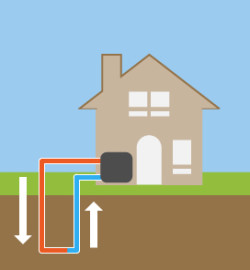Conventional heating and cooling systems work hard to condition air to keep your home comfortable. All of that hard work shows up on your energy bills. Geothermal heat pumps can provide some welcome relief, maintaining year-round comfort while using far less energy.
How geothermal systems work
Geothermal systems take advantage of the relatively constant temperature underneath the ground to provide highly efficient heating and cooling.
A system consists of a heat pump unit and a series of pipes buried underground. To provide cooling, a fluid absorbs heat from indoor air through a heat exchanger. The heat pump moves the heated fluid through the pipes where the heat is discharged underground. The fluid — now at a lower temperature — returns to the heat pump, where it absorbs more heat. In winter, this process is reversed, as heat from the ground is transferred into the home.
Geothermal heat pumps may cost more to install than conventional heating and cooling systems. However, their lower maintenance and operational costs, as well as system durability, can make it well worth the investment.
The benefits of geothermal systems
In use since the 1940s, this proven technology offers a number of advantages over conventional units:
- Energy savings. Geothermal heat pumps use 25% to 50% less energy than conventional heating and cooling systems.
- Humidity control. Geothermal systems provide excellent humidity control, maintaining about 50% relative humidity indoors, making them effective in humid climates.
- Less maintenance. These systems have few moving parts; this reduces maintenance needs and increases system durability. Geothermal units typically last 20 years or more.
- Quiet operation. Geothermal systems have no outdoor condenser or fan, so there's no worry about outside noise. The unit in the living space runs very quietly.
- Flexibility. These heat pumps are a good fit for both system upgrades and for new construction. Geothermal system components require less space than conventional heating and cooling units.
- Lower emissions. Since heat pumps don't burn fossil fuels to produce heat, they generate far fewer greenhouse gas emissions than a conventional furnace.
Make sure your heat pump is ENERGY STAR®-certified. ENERGY STAR geothermal heat pumps are independently tested to ensure that they provide high-efficiency performance.
Beltrami Electric Cooperative offers great rebates for the installation of a geothermal heat pump system.
Tax credits are also available for geothermal heating installation. Be sure to check with your tax preparer to ensure you take advantage of those additional savings!

